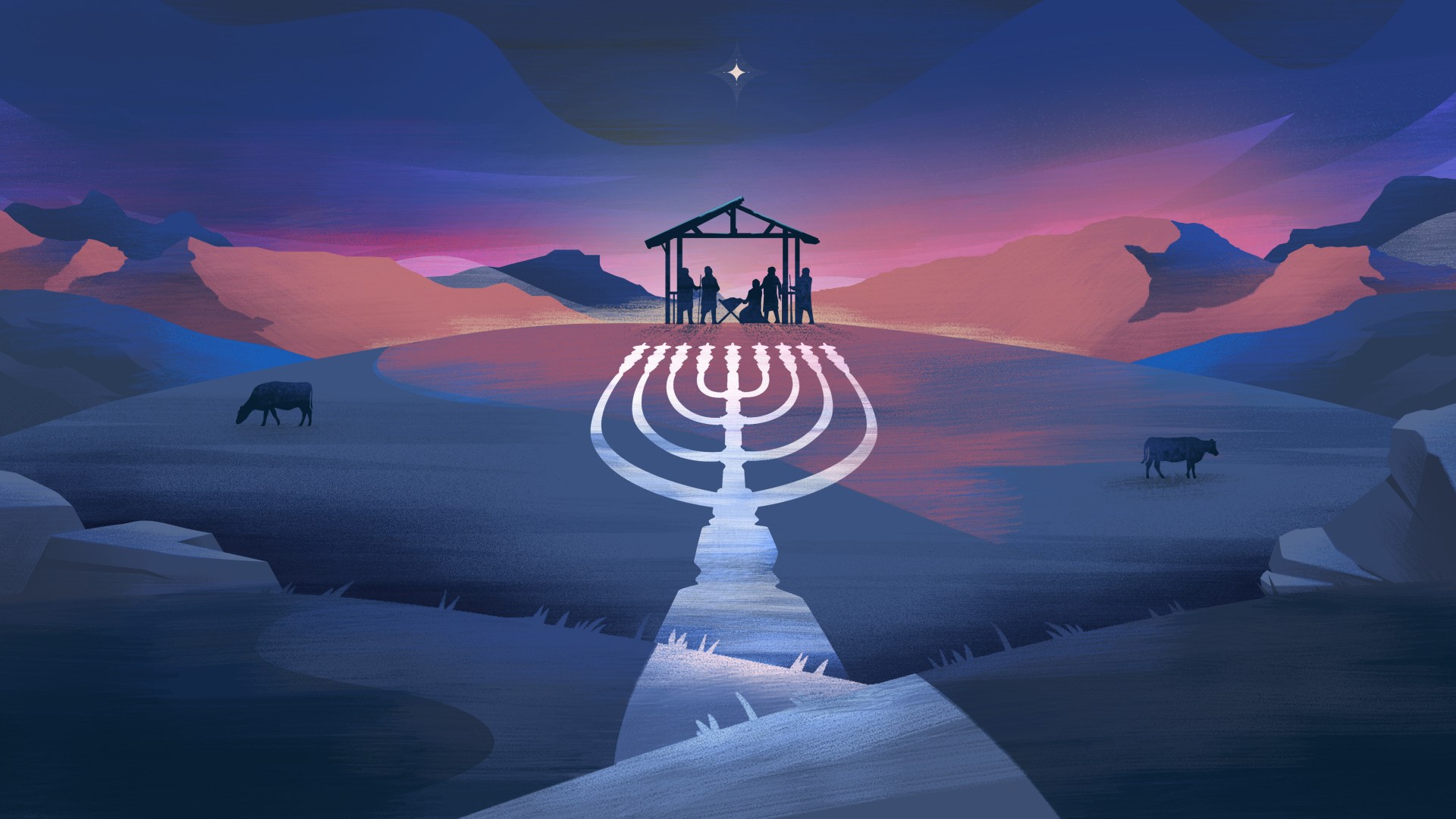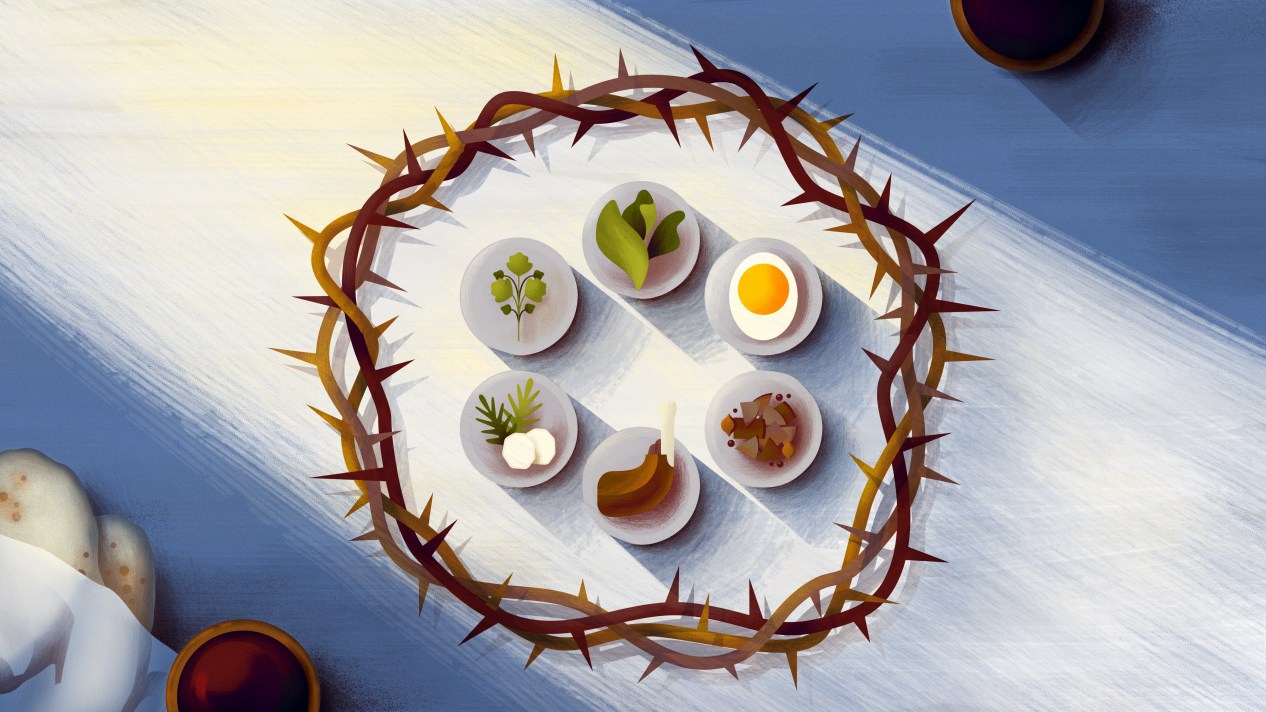Jen Cohen Wallace has a Hanukkiah (a menorah with two extra candles) in the shape of a Stegosaurus. He’s a little guy, with nine small candles running down the curve of his scaly back. Every December, one night at a time, Jen and her family light a candle through all eight nights of Hanukkah.
The Wallaces are Messianic Jews, which means they are Jewish people who believe in Jesus. Jen’s desire to know Jesus more deeply while honoring her family’s heritage has resulted in a growing collection of Hanukkiahs, which now pepper her house each winter. Some are homemade, molded from clay by little hands. Others are weightier—her favorite is wrought-iron.
In the glow of twinkle lights and candle flame, Jen cooks latkes (potato pancakes), cranberry sauce, and homemade applesauce. For each of the eight nights, the Wallaces commit to a single, special activity, ranging from board games to dance parties. And then by the fireplace, they read aloud the Hanukkah story.
The cumulative goal of the food and lights and dancing is to make חֲנֻכָּה or חֲנוּכָּה (Hebrew terms most commonly translated as Hanukkah or Chanukah) real to her kids by engaging their senses. “It’s moving a concept into a reality,” Jen says. She focuses on taste, smell, and touch because “senses are involved in remembering.”
After all, to remember is the heart of every Jewish feast from Yom Kippur to Hanukkah. “It shall be to you as a sign on your hand and as a memorial between your eyes,” Moses tells the Israelites when he shows them how to celebrate the Passover each year (Exodus 13:9). When Christians take communion—like Jesus did at his last supper with his disciples—and when they celebrate Christmas with candles and carols and feasts, they join a legacy of remembering God’s faithfulness with both their minds and bodies.
As the Hanukkiah candles flicker shadows on the stucco walls of Wallace’s home, she tells her kids about how God saved his people with the light of a candle.
Remembering the Light
The miracle of Hanukkah occurred between the end of the Hebrew Scriptures (Old Testament) and the recorded history of Jesus’ life. Roughly 200 years before Jesus’ birth, Greek King Antiochus IV Epiphanes was on a bloody tour of world domination. When he came to Israel, he destroyed the Temple, declared himself god, and ordered his soldiers to murder anyone who refused to worship him.
In Modi’in on the outskirts of Jerusalem, a revolt began, led by an old Jewish priest named Mattathias. By the hand of God, these Jews, known as the Maccabees, overthrew their would-be conquerors and began to rebuild. When it came time to re-dedicate their Temple, however, they discovered they only had enough oil to light the temple menorah for one day. It would take eight more days to prepare another batch of sanctified oil, but the Jews decided to light the menorah with the oil they had. Miraculously, it burned for eight nights.
Jewish believers like Jen and her family celebrate Hanukkah for the miracle but also for the metaphor. While many Old Testament stories follow this pattern–the Jewish people who need rescue and a God who intercedes–Hanukkah points to God’s ultimate saving of his creation in Jesus. Unlike the temple menorah with only seven candles, the Hanukkiah holds nine: the final flame is called the “shamash,” or servant candle, and it’s used to light all the others. It burns first so they can burn, too.
Carrying the Light
In John 8, Jesus tells his followers that he is the “light of the world.” When he spoke those words, his Jewish audience would have heard them like an alarm bell ringing. He wasn’t just painting a pretty picture with poetic language. He was drawing on their knowledge of all the Old Testament prophecies and the Hanukkah story to reveal who he was: the long-awaited Messiah–the divine messenger.
As a Jewish man, Jesus knew the traditions and feasts. He knew every law, prophecy, custom, and festival, including Hanukkah. John 10 tells us that Jesus was in the temple walking in Solomon’s colonnade as the “Feast of Dedication took place at Jerusalem.” That’s Hanukkah–and Jesus traveled all the way from Galilee to Jerusalem to celebrate it.
That’s why for Messianic Jews like the Wallaces, observing Hanukkah is an invitation to step closer to Jesus–to hear and taste and see and remember. Knowing the story of the Jewish people is an invitation to know Jesus more.
That invitation extends to everyone who believes in Jesus, Jewish or not. In fact, when Christians gather to celebrate Christmas with candles and cookies and midnight carols, they are standing in the centuries-old glow of Hanukkah. Because in the long arc of the story of God’s redemption, “there would be no Christmas without Hanukkah,” says Rabbi Jonathan Bernis, President and CEO of Jewish Voice Ministries International.
Bernis believes that the redemption of the world depended on Jewish survival. The Christian story depends on the Jewish epic. Had God not preserved the Jewish people, Jesus–the Jewish Messiah and the Savior of all mankind–might never have been born. The journey from Hanukkah to Christmas sings the long refrain of the Old Testament: God sustains his people, in miracles of arks and plagues and a single oil lamp, and it’s through the Jewish people that he sends his Messiah.
Jewish Voice exists to bring the Good News to Jewish people still awaiting the Messiah and to help Christians discover the Jewish roots of their faith. This year, Jewish Voice is inviting Christians who want to learn more about these histories and traditions to download a free daily video, which is part devotional and part Hanukkah primer (what’s that dreidel for, exactly?).
Anyone can sign up for this free Hanukkah devotional. As you grow to appreciate both the miracle and metaphor, perhaps next winter your mantle will hold a scaly-backed Stegosaurus Hanukkiah, complete with nine candles to remember God’s faithfulness in your family, too.
Maria Baer lives in Columbus, Ohio with her husband and two children, who are Jewish believers in Jesus. She co-hosts Breakpoint This Week with The Colson Center for Christian Worldview and attends Cross City Church.
Posted
